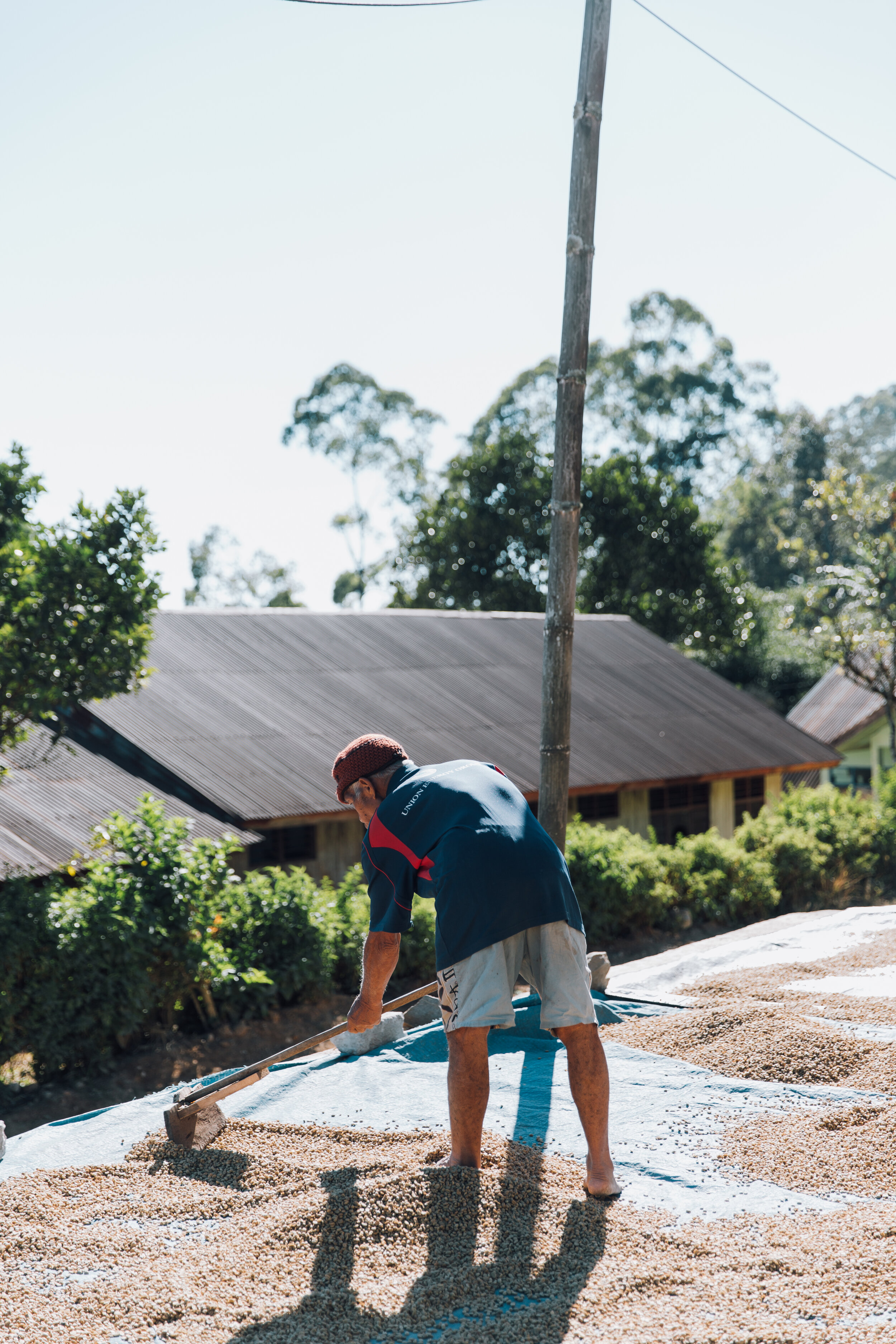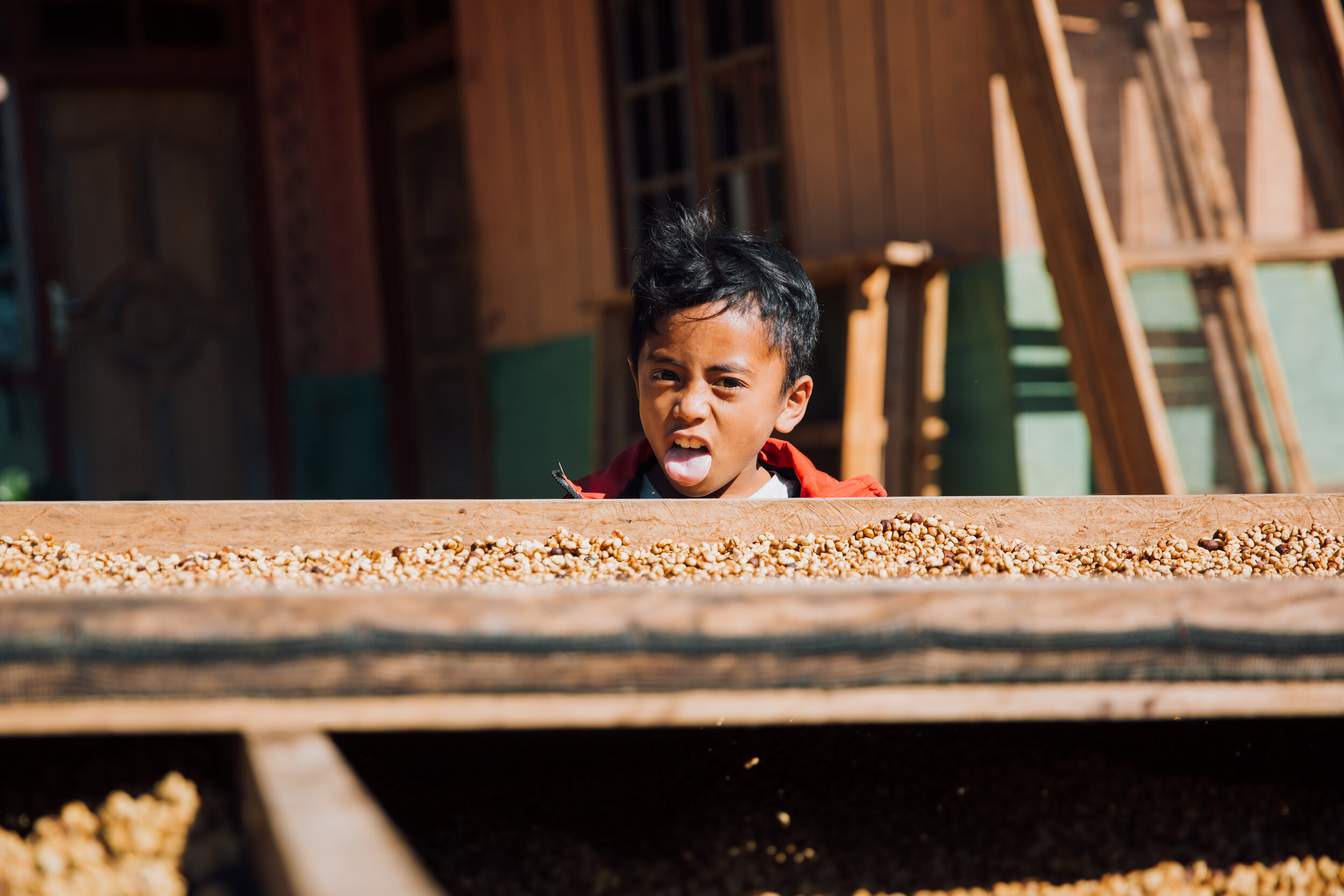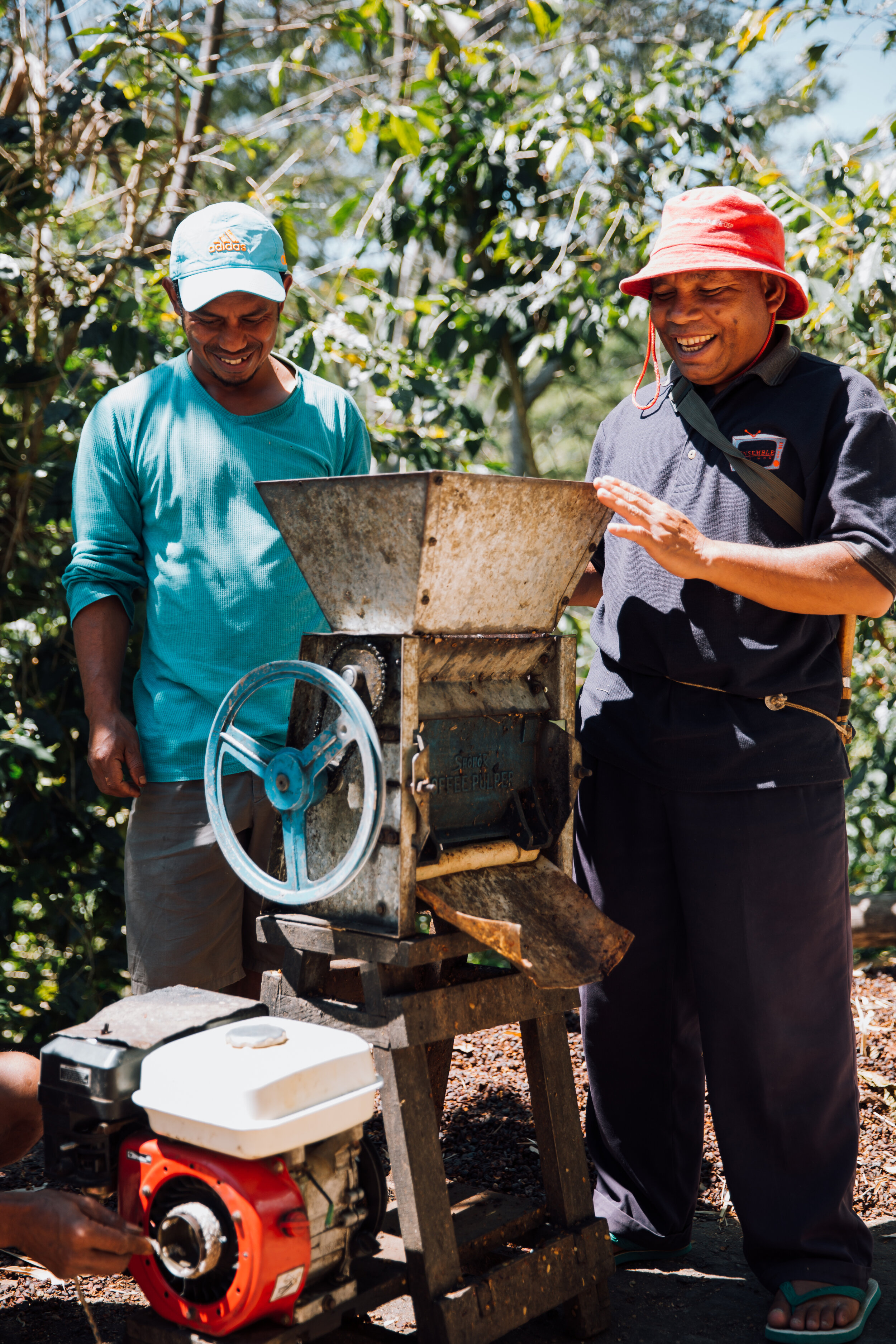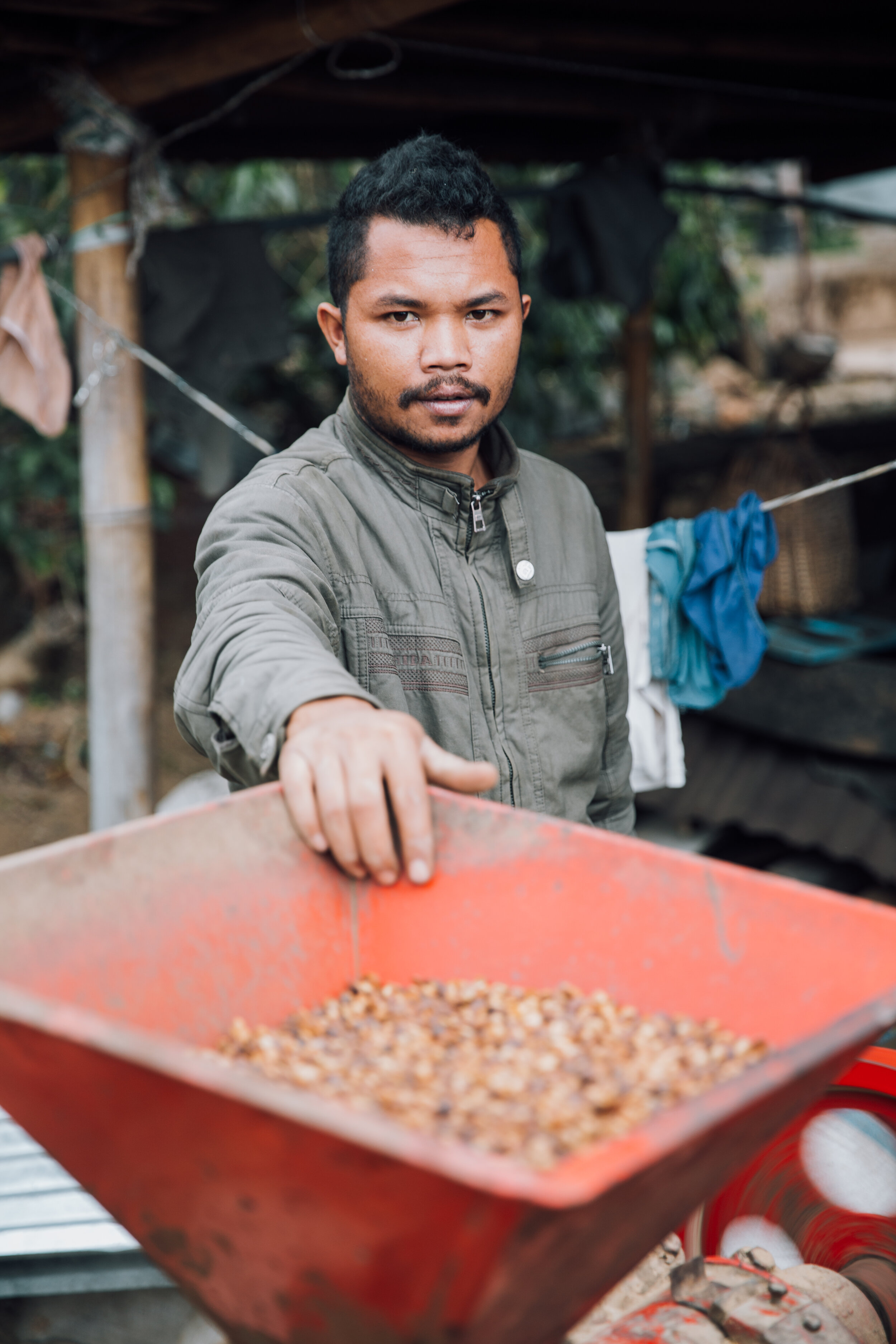where specialty robusta began for us
At the time in 2016, this certainly was our most controversial project. Having studied the successes of specialty robusta in India and Ecuador, we thought of the idea of upgrading the existing, low growing robusta on the island of Flores. Through Adri Yahdiyan, founder of Ontosoroh Coffees, we learned that not only does the island boast a range of unique robusta varieties, but that the quality of these "fine robustas" was already known worldwide. He then introduced us to ASNIKOM, a locally owned cooperative in the regency of Manggarai who could do something as radical as intuitive: process robusta with the same machinery and standards as arabica - and we vowed to pay them the same premium as they would get for fine arabicas. In 2017, the first results came in: a spicy, very full bodied robusta that is pleasantly bitter because of its caffeine content, sweet chocolaty and very clean.
Since 2018, our crop was sourced from three families within a single village of Rende Nao as opposed to multi sources (within Manggarai) last year. We also tweaked the pulped natural and did some semi-washed and fully washed experiments to highlight body and the crisp chocolaty overtones. For the unbiased roaster, this coffee could either be a wacky single origin or a beautiful supplement to blends that provide the flavour that traditional coffee drinkers sometimes miss so clearly (and vocally) in our specialty coffee niche...
CULTIVARS :
Unique robusta varieties derived from natural cross-pollination.
ALTITUDE :
1,200 - 1,600 meters above sea level.
NOTABLE :
Our first robusta, and part of an ambitious project with two NGOs (VECO, Ecoflores) and two progressive coffee companies (Ontosoroh and Pelan Beans) to create a specialty robusta standard for the entire island of Flores.
PROCESSING :
honey : the coffee cherries are handpicked in the morning and pulped immediately by sunset on site. Each families have these huts in the middle of the plantation to pulp and semi dry the coffees before taking them to the final UPH to be fully dried.
natural : coffee cherries handpicked and laid out on beds immediately between 10 and 14 days.
Key ACHIEVEMENTS :
2016: created a cross-industry partnership to promote and upgrade specialty robusta from Flores.
2017: local coop ASNIKOM used arabica standards to process fine robusta; imported first pilot shipment to Europe.
2018: sourced from three families in one village (Rende Nao) only, upgraded pulped natural by ceasing green bean drying, created semi-washed and fully washed drying experiments that gave more insights into how best to highlight Flores robusta's unique flavour profile.
2019: created a step by step manual with checkboxes to improve quality during the harvest and post-harvest. The results of this approach were seen immediate in the cupping scores and uniformity of the coffees.
2020: went from 160 to 600 bags of coffee from Rende Nao farmers and paid +0,20 USD /kg farmgate price. Labeled every single bag according to farmer. This enormous scale up actually led to better cupping scores too.
2021: retained the same amount of coffee bags and price as 2021 despite the pandemic. The Circular Fashion Project is born, and gorgeous new cotton bags were designed by Spanish designer Sylvia Calvo and her team to be reused as garments or tote bags. At the same time, the Regenerative Robusta Project is born in Flores, the first steps begin to develop.
2022: The Regenerative Robusta Project first visible results sprout.
2023: we significantly increase our Rende Nao stock, making it our most sought coffee in our Indonesia portfolio. The Circular Fashion Project launches its second season. New creative possibilities sprout.
TASTIFY™ CUPPING NOTES :
PHOTO GALLERY :
You may use these images freely to promote Rende Nao among your customers. Please credit Dick Wynendaele if you do.
OUR SPECIALTY ROBUSTA PROJECT IN FLOREs:
In 2015, the wonderful Nina van Toulon of Ecoflores introduced us to the Indonesian island of Flores and its coffee. She calls this eco-diverse paradise home for more than ten years and has become passionate about saving her from plastic pollution, both on the ground and in the sea. What's more, she felt that development aid alone was not delivering enough results and thought perhaps Flores' coffee might hold the key. She told us about the island's prizes for its unique arabica coffees - but we soon found that elevation constraints would be a huge problem if we were to try to make specialty coffee production viable as a means to raise social and environmental standards on the island.
Some months later, having read about the successes of specialty robusta in India and Ecuador, we thought of the idea of upgrading the existing, low growing robusta on the island instead. We got in touch with Adri Yahdiyan, founder of Ontosoroh Coffees and found that not only does the island boast a range of unique robusta varieties, but that the quality of these fine robustas is known worldwide among the old coffee buyers and roasters us Third Wave snobs hardly ever hear about. In fact, our partners at ARC in Italy confirmed that "Flores Gr.2" robusta is always in high demand because of its clean cup and chocolaty notes.
For our bold plans to come to life, Adri recommended we talk to ASNIKOM, a well-organised and locally owned cooperative in Manggarai who would be able to process robusta with the same machinery and standards as arabica - and we vowed to pay them the same premium as they would get for fine arabicas. We later learned that Nina's partners at VECO - an esteemed NGO that has been active in upgrading agricultural livelihoods for years in Flores - already worked with ASNIKOM and were very interested in technically supporting our project to create a true specialty robusta. This stroke of luck that strong ties already existed between all parties made it possible for changes to be made to the group's robusta production relatively quickly.
In 2017, after one year of cooperation the first results manifest in stock: a spicy, very full bodied robusta that is naturally bitter because of its caffeine content, sweet chocolaty and very clean. Some progressive roasters are already showing that if we can get over our preconceptions, this coffee can work as an unusual but chocolaty single origin espresso (with heaps of crema) or more likely, a blend supplement that adds a recognisable coffee flavour for more traditional drinkers. In our view, it's an even bigger surprise to specialty coffee enthusiasts once they are able to reconnect with their "pre-specialty" self!
Soon after, a surprisingly good reception of this coffee (some roasters even offered it as a single origin espresso), offered an unanimous feedback: this is one of the best robustas specialty roasters had ever tried, with a total lack of negative flavours usually associated with robusta (which mostly has to do with processing!). One minor comment that was noted was the Manggarai's body is relatively light for a robusta, while many roasters choose robusta in their blend to accentuate body especially. This led Adri of Otosoroh to propose two things: 1) more traceability by sourcing from a few quality focused families in the village of Rende Nao only and 2) processing experiments based on his experience in Sumatra: a fully and semi washed version. For the fully washed coffee, after pulping, it is washed and fermented for 24 hours. After, it is washed again and dried. The semi wash process is quite similar but with elimination of the second washing step. Lastly, we ceased to dry the green beans for the pulped natural, which increased the humidity homogeneity tremendously last season. We are finding already that these three coffees far surpass last season's cup quality, and will choose which processing types we want to continue next season based on roaster feedback.
In August 2019, Maarten visited ASNIKOM in Rende Nao together with roaster friends and Adri from Ontosoroh. Whilst walking through the fields, alongside the pulping stations and having cups of excellent coffees at the farmers houses, they discussed the swings in the coffee quality and uniformity, and what to do about it. A plan was made to create a step-by-step manual in the harvest and post-harvest process. Not because out of distrust or lack of expertise, but in order to identify abnormalities in the process and to identify single farmers that could use some extra training during the season. By identifying these weak spots, the overall quality and homogeneity of the coffees saw instant improvements.
Since 2020, Rende Nao continues to be a huge success, especially because This Side Up landed a tender to supply the Dutch Ministry of Infrastructure with coffee at all their offices - and Rende Nao forms a large part of this blend. Mainly for this reason, we were able to increase our order from 160 to 600 bags in the 2020-2021 season. This major increase required a lot of extra training on the part of ASNIKOM to see to the required quality. As an added incentive, we decided to up the farmgate price to 4,14 USD/kg. All bags are labeled according to farmers like last year, and the quality of the lots overall increased significantly, even with this enormous spike in quantity. We are very proud of Ontosoroh and ASNIKOM for their combined quality control efforts both at wet and dry mill level.
In 2021, we started an exciting new project: the circular fashion project, together with renowned circular designer Sylvia Calo. Lennart met her at the Dutch Fashion Week through our friend Pere Cornellà. Over a coffee, she shared her idea to intervene in the design stage of the coffee bags so she could use the material to make designer clothes for her new collection. Free resources because she's piggybacking off an existing value chain, more value added at origin and awesome looking coffee bags... This year, we made it reality. Adri outdid himself and made sure that even all the ink used was 100% biodegradable. Very proud of this multi-chain collaboration that exhibits true circularity!


























